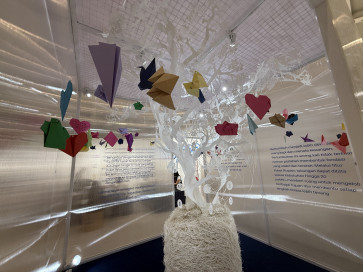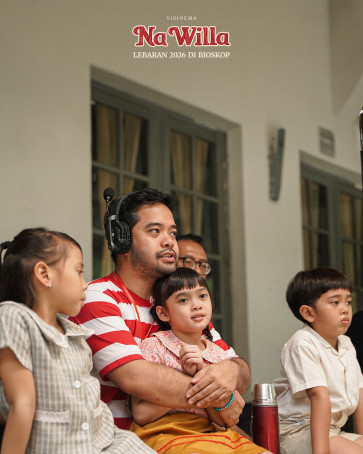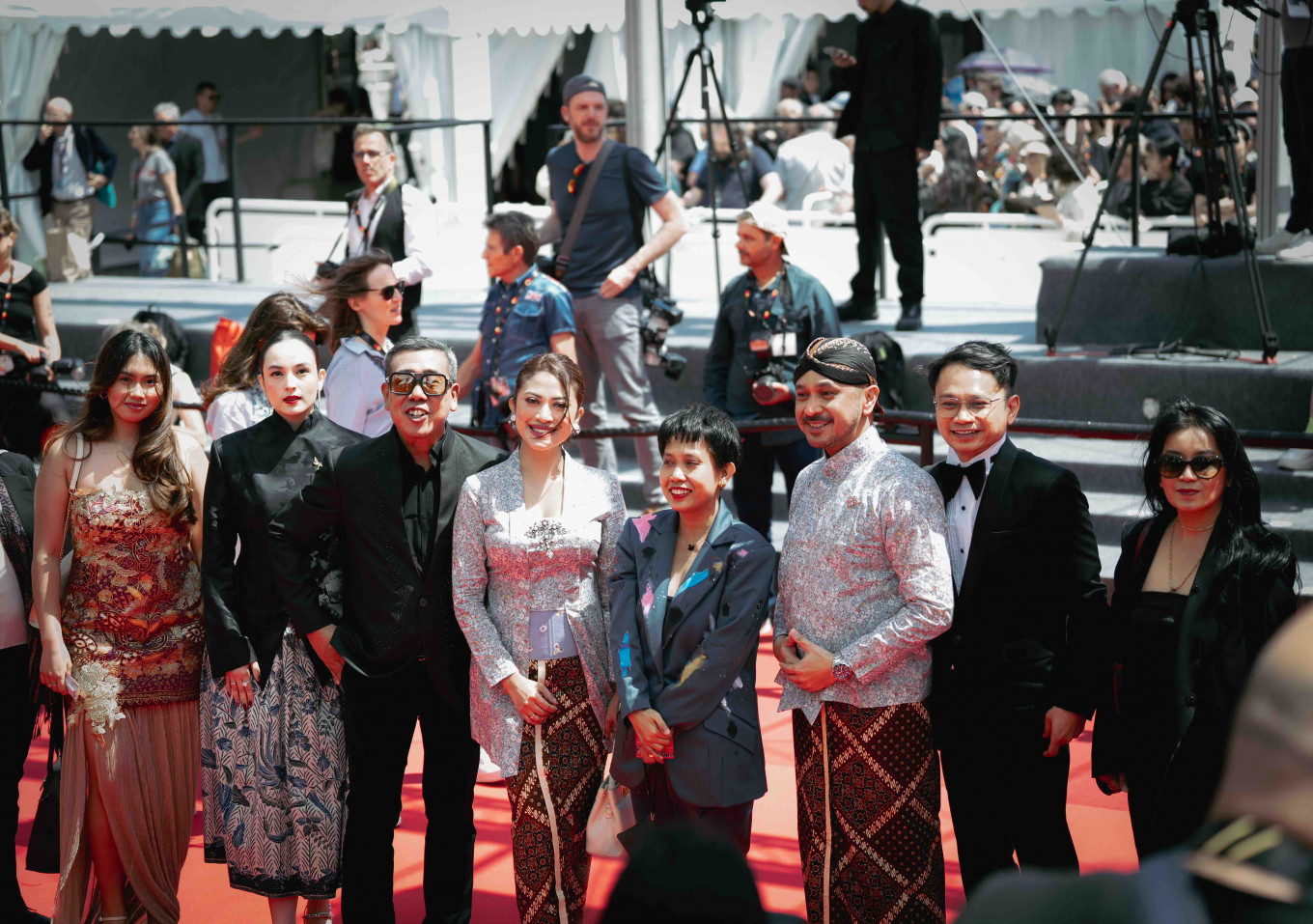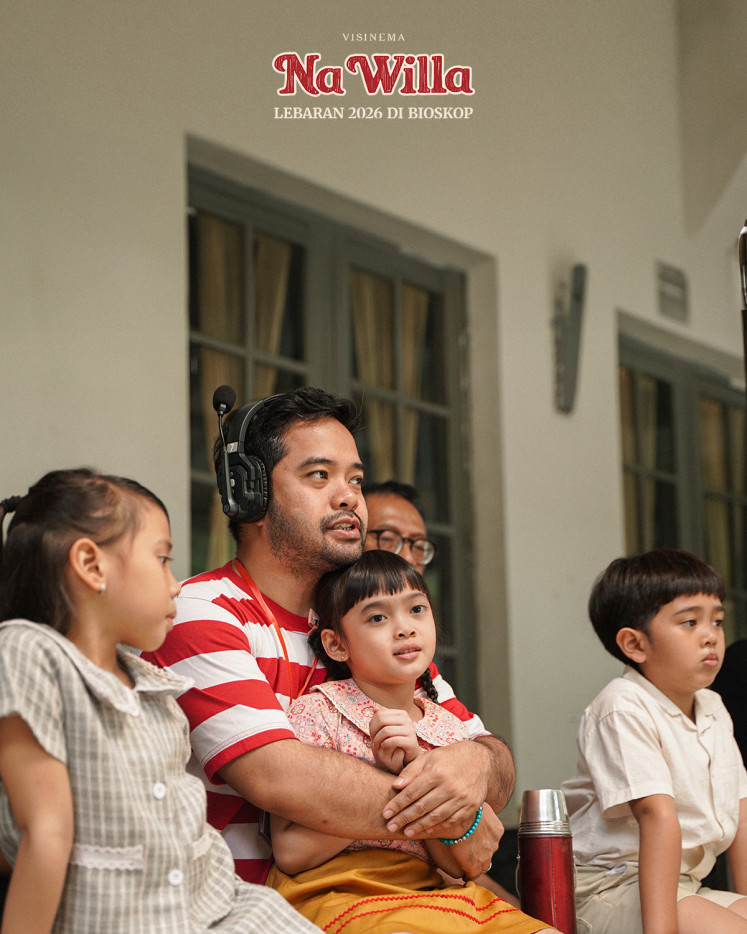Yulia Evina Bhara (fourth from right), coproducer of 'Renoir' (2025), joins Vice Minister of Culture Giring Ganesha (third from right) and the Indonesian delegation on the Cannes red carpet for the film’s world premiere on May 17, 2025.
I grew up on When Harry Met Sally and Sex and the City, shows where the city was more than a backdrop. It was a character in its own right, flawed yet magnetic and alive.
But that’s New York, not Jakarta.
Jakarta is rarely seen the way New York is seen in movies. That is, until I watched Home Sweet Loan (2024). For once, Jakarta felt alive too: sprawling and suffocating, exhausting but full of promise.
A good setting doesn’t just house a story. It amplifies mood and reveals the characters.
I remember watching the second episode of The Last of Us and the thrill of seeing Christine Hakim in the Jakarta-set. Except, of course, it was filmed in Canada.
If it had been shot here? The impact could’ve boosted our creative economy and spotlighted our city’s image.

Thank you!
For signing up to our newsletter.
Please check your email for your newsletter subscription.
It was a missed opportunity, but just like the city, we can make our own.
At the Cannes Film Market, Jakarta launched its first-ever pavilion. The goal? To make Jakarta a city of cinema by its 500th birthday in 2027.
The plan is bold, and the presence was promising. Deputy Governor Rano Karno, Jakarta Film Week’s festival director Rina Damayanti and international coproducer Yulia Evina Bhara flew in to plant the flag.
“It’s important to have a vision,” Rina says.
“But we also need to understand what needs to be prepared.”
She’s right. So, do we have what it takes to become a city of cinema?
Lights, camera … bureaucracy?
Filming in Jakarta isn’t just difficult. It’s expensive.
Location rentals are high. Then come locals posing as “officials”, piling on extra charges. The result? Filmmakers take their budgets elsewhere.
“Accommodation, hotels, transportation and food that would normally be prepared for 20 days of filming in Jakarta are no longer being booked here, because the production is being filmed outside the city,” Rina explains.
“This is a financial opportunity Jakarta is losing.”
But money isn’t the only problem.
“To make Jakarta the city of cinema, filming permit regulations need to be fixed,” Rina adds.
Right now, obtaining a permit is a bureaucratic labyrinth. There’s no one-stop system, and the process isn’t streamlined. The challenges don’t end there, pungli (extortion) and interference from local authorities add more layers of frustration.
A clear solution, Rina says, is the formation of a Jakarta Film Commission, a formal body that would simplify permitting, eliminate unofficial fees and help filmmakers claim their tax incentives.
It’s not about boosting creativity, it’s about building trust and making a place where filmmakers can create without roadblocks.
More screens, more stories
Becoming a city of cinema isn’t just about supporting filmmakers. It’s also about giving audiences access to stories.
That means more screens in more places: open-air screenings, public venues and community-driven film events. More places to gather and watch stories unfold.
"If we want to make Jakarta a city of cinema, then the city needs to be friendly to film production and distribution." - Rina Damayanti
At the recent Jakarta Future Festival, Rano pointed out a stark gap: Indonesia only has around 2,145 cinema screens, compared with 86,310 in China and 40,700 in the United States. That’s one screen for every 120,000 people in Indonesia, versus one for every 20,000 in China.
“Despite having the highest number of cinema screens in the country, Jakarta still doesn’t have enough,” Rina says.
That’s where Jakarta Film Week comes in. Backed by the Jakarta Tourism and Creative Economy Agency, the festival has screened films for free to the public for four years straight, partnering with venues like Taman Ismail Marzuki and local museums. In 2024 alone, it reached over 170,000 viewers, both online and in-person
The Jakarta Film Fund, one of its key programs, also offers grants to Jakarta-based short filmmakers, serving as a launchpad for emerging talent to connect with industry professionals.
“If we want to make Jakarta a city of cinema, then the city needs to be friendly to film production and distribution for the people of Jakarta,” Rina says.
The first move? Private investors stepping in to expand cinema screens. The second? The regional government and state-owned enterprises backing local talent on global platforms.
Local talent, global reach
Declaring Jakarta the “City of Cinema” by 2027 is just the starting line. To get there, we’ll need more than infrastructure. We’ll need a clear path for our talent to thrive, both at home and abroad.
We’re not short on talent. Many of the country’s most exciting voices in film are based here and they’re already earning international acclaim. Most recently, Edwin from Palari Films won the Golden Leopard at the Locarno Film Festival for Seperti Dendam, Rindu Harus Dibalas Tuntas (Vengeance Is Mine, All Others Pay Cash, 2021).
Yulia Evina Bhara recently competed for the Palme d’Or at the Cannes Film Festival with Renoir (2025), a Japanese-Indonesian coproduction. Her success is proof of what our filmmakers can do when given the right access and collaborators.
“When I started coproducing internationally in 2017, it was because I needed to access funding in certain countries where one of the requirements is coproducing with their local filmmakers,” Yulia says.
What began as a workaround has since become part of her creative toolkit. Coproductions now help her tell stories that are culturally rooted, yet globally resonant.
“I always enable my partners to get involved in the script to make a very local story more universal,” she says.
That collaborative approach is a strength and a signal that our filmmakers can speak to the world without losing their voice. If the city’s ecosystem catches up with its talent, these international wins could become the rule, not the exception.
From dream to ecosystem
Since the New Order era, Jakarta has been the center of gravity. The world has the American Dream; Indonesia has the Jakarta Dream.
The film industry has long mirrored this centralization. But with rising unemployment, unclear recruitment paths and an industry ceiling that feels impenetrable, Jakarta still has more work to do. The struggle is real for both emerging and established talents.
Still, progress is underway. Jakarta Film Week supports young producers and nurtures new talent with programs like Producers Lab.
“One of the objectives is to help them speed up their film production by preparing them to apply for other labs, pitching sessions and grants,” says Yulia, who is a mentor in the program.
Rina Damayanti, festival director of Jakarta Film Week, walks alongside Jakarta Vice Governor Rano Karno at this year’s Cannes Film Festival in mid-May. (Photo courtesy of Jakarta Film Week)
On the audience’s side, growing ticket sales hint at a rising appetite for cinema. But by 2027, will we have enough seats to match the demand?
The answer lies in structure, not just vision.
Rina and Yulia are clear: To make Jakarta a City of Cinema, passion isn’t enough. We need systems that are sustainable, transparent and long-term.
That means government support for festivals, better creative infrastructure and serious investment in people.
After all, a title like “City of Cinema” isn’t handed out. It’s built frame by frame, scene by scene.
Reza Mardian is a winner of the Best Film Critic award at the Festival Film Indonesia 2024 and a "pawrent" to two rescued cats. He writes screenplays every time he finishes rewatching La La Land or Lady Bird.
























